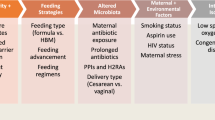Abstract
Objective
To evaluate the efficacy of oral zinc salt on the incidence of hyperbilirubinemia and need for phototherapy between 25 and 168 h of age in term and late-preterm at-risk neonates cared at a tertiary care hospital in New Delhi, India.
Methods
In all neonates born at ≥35 wks’ gestation, serum total bilirubin (STB) was assayed at 24 ± 6 h of age. At-risk neonates, neonates with STB levels ≥6 mg/dL, were given either 10 mg of zinc gluconate salt (n = 148) or placebo (n = 146) in twice daily doses till day seven of age. Jaundice was assessed clinically and STB was measured by spectrophotometry. Neonates were followed up until day seven of age. Primary outcome measure was incidence of hyperbilirubinemia (STB ≥ 15 mg/dl). Secondary outcome measures were mean STB level at 72 ± 12 h of age, proportion of infants requiring phototherapy, and duration there of.
Results
Risk factors for hyperbilirubinemia, including male gender, gestational age, birth-weight, incidence of birth trauma, ABO incompatibility, hyperbilirubinemia in previous sib, etc. were comparable in zinc and placebo groups. The incidence of hyperbilirubinemia was comparable in both the groups (17.9% vs 19.1% in zinc and placebo groups respectively; OR = 0.95, 95% CI: 0.50 to 1.67; P = 0.92). The requirement of phototherapy (14.5% and 12.0% in zinc and placebo groups respectively; OR = 1.24, 95% CI: 0.95 to 2.6; P = 0.54) was comparable in both the groups; however, duration of phototherapy was shorter in zinc group (duration in hours, 22.8 ± 19.4 vs 35.6 ± 16.1 in zinc and placebo group respectively; mean difference = −12.8, 95% CI: -24.73 to −0.92; P = 0.04). There was no difference in the mean STB levels at 72 ± 12 h of age between zinc and placebo groups (mean difference in mg/dL: 0.20, 95% CI: 1.0 to −0.64). No significant adverse effects related to oral zinc administration were noted.
Conclusions
Twice daily administration of oral zinc in a dose of 10 mg/day does not reduce the incidence of hyperbilirubinemia in at-risk term and late-preterm neonates during first wk of age.

Similar content being viewed by others
References
Narang A, Gathwala G, Kumar P. Neonatal jaundice: an analysis of 551 cases. Indian Pediatr. 1997;34:429–32.
Shapiro SM. Bilirubin toxicity in the developing nervous system. Ped Neurol. 2003;29:410–21.
Knudsen A. Prediction of the development of neonatal jaundice by increasing cord bilirubin. Acta Pediatr Scand. 1989;78:217–21.
Maisles JM, Newman TB. Predicting hyperbilirubinemia in newborn: commentary. Pediatrics. 1999;103:6–14.
Bhutani VK, Jhonson L, Sivieri EM. Predictive ability of predischarge serum bilirubin for subsequent significant hyperbilirubinemia in healthy term newborns. Pediatrics. 1999;103:131–9.
Agarwal R, Kaushal M, Agarwal R, Paul VK, Deorari AK. Early neonatal hyperbilirubinemia using first day serum bilirubin level. Indian Pediatr. 2002;39:724–30.
Odell GB, Gutchetr GR, Whitington PF, Yang G. Enteral administration of agar as an effective adjunct to phototherapy of neonatal hyperbilirubinemia. Pediatr Res. 1983;17:810–4.
Mendez-Sanchez N, Roldan-Valadez E, Flores MA, Cardenas-Vazquez R, Uribe M. Zinc salts precipitate unconjugated bilirubin in vitro and inhibit enterohepatic cycling of bilirubin in hamsters. Eur J Clin Invest. 2001;31:773–80.
Vitek L, Munchova L, Zelenka J, Zadinova M, Malina J. The effect of zinc salts on serum bilirubin levels in hyperbilirubinemic rats. J Pediatr Gastroenterol Nutr. 2005;4:135–40.
Mendez-Sanchez N, Martinez M, Gonzalez V, Roldan-Valadez E, Flores MA, Uriebe M. Zinc Sulphate inhibits the enterohepatic circulation of unconjugated bilirubin in subjects with Gilbert syndrome. Ann Hepatol. 2002;1:40–3.
Ballard JL, Khouri JC, Wedig K. New Ballard Score, expanded to include extremely premature infants. J Pediatr. 1991;119:417–23.
American Academy of Pediatrics, Clinical Practice Guideline. Management of hyperbilirubinemia in the newborn Infant 35 or more weeks of gestation. Pediatrics. 2004;114:297–316.
Strand TA, Chandyo RK, Bahl R, et al. Effectiveness and efficacy of zinc for the treatment of acute diarrhea in young children. Pediatrics. 2002;109:898–903.
Bahl R, Bhandari N, Saksena M, et al. Efficacy of zinc fortified oral rehydration solution in 6- to 35-month-old children with acute diarrhea. J Pediatr. 2002;141:677–82.
Low risks of adverse effects from zinc supplementation. New diarrhea management guidelines. The zinc task force (UNICEF, UNSAID, WHO and JHSPH) [online]. 2006 [Cited 2007 June 3]. Available from: http://www.izincg.org/pdf/ZincToxicitySafety_ZTF_2006.pdf
Conflict of Interest
None. The paper has been presented as Platform Presentation in 2009 PAS meeting at Baltimore.
Role of Funding Source
Zinc and placebo bottles were provided by Shalakas Pharmaceuticals Pvt.Ltd. However, they had no role in the design, conduct, analysis and reporting of the study.
Author information
Authors and Affiliations
Corresponding author
Rights and permissions
About this article
Cite this article
Rana, N., Mishra, S., Bhatnagar, S. et al. Efficacy of Zinc in Reducing Hyperbilirubinemia among At-Risk Neonates: A Randomized, Double-Blind, Placebo-Controlled Trial. Indian J Pediatr 78, 1073–1078 (2011). https://doi.org/10.1007/s12098-011-0407-z
Received:
Accepted:
Published:
Issue Date:
DOI: https://doi.org/10.1007/s12098-011-0407-z



